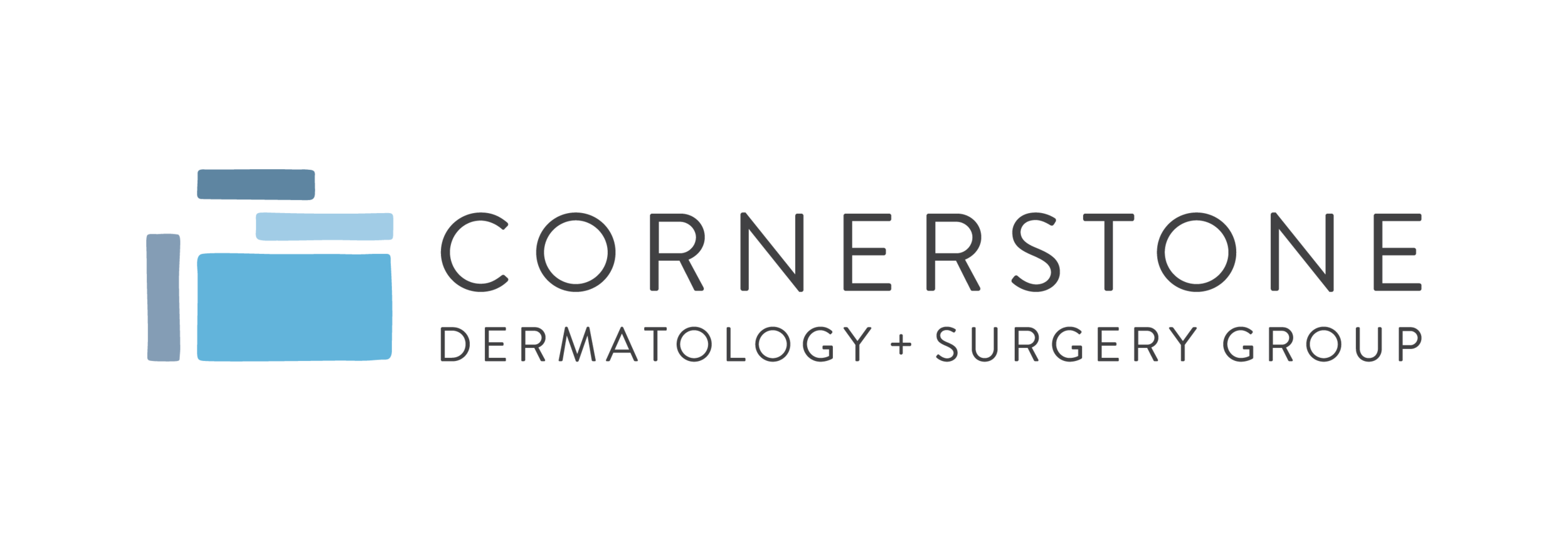Retinol vs. Retinoids: Which Should I Use?
Retinoids are a cornerstone of successful acne treatment, and when paired with sun protection, they’re also the foundation for effective anti-aging regimens. They provide excellent defense against fine lines and help to give the skin a healthy glow. Because of these broad-reaching effects, retinoids are a gold standard in skincare.
You can find retinol in a multitude of over-the-counter skin care products, and retinoids are commonly prescribed for both medical and aesthetic dermatology purposes.
So how is retinol different from retinoids and which one should you use?
In this article, we hope to clarify the benefits, strength and efficacy of retinoid products, resulting in the very best possible treatment and outcome for you at Cornerstone Dermatology & Surgery Group. If you’re just starting out incorporating retinoids into your acne or anti-aging regimen, we recommend scheduling with one of our providers to provide personalized recommendations for your skin.
Retinoids vs. Retinol: Benefits and Basics
A retinoid is a derivative of Vitamin A, which works to speed up skin cell turnover and accelerate new skin cell regeneration. The strong biologic effects of retinoids are based upon their ability to bind to receptors within the cytoplasm and nucleus of keratinocytes (the fancy word for the main cell type in the top layer of the skin, the epidermis).
On the skin’s surface, the result of consistent topical retinoid use is a healthy glow due to the more rapid sloughing away of dead skin cells, clogged pores and dull skin. Under the surface, retinoids work deep within the skin's dermis to stimulate collagen and elastin production, resulting in a more youthful appearance and the prevention of fine lines and wrinkles.
Retinol is actually a type of retinoid. It is commonly incorporated in over-the-counter skin care products in concentrations of .5 to 1 percent. While retinol is an active ingredient in many cosmetic and over-the-counter anti-aging products, the term ‘retinoid’ is generally used to describe products prescribed by your medical provider.
Retinoids vs. Retinol: Structure and Strength
The strength of an over-the-counter retinol versus a prescription-strength retinoid lies within the conversion of the initial molecular structure.
At the molecular level, the conversion sequence goes from 1) retinyl esters to 2) retinol, which gets converted to 3) retinaldehyde, which gives rise to the final product 4) retinoic acid. This biologically active form, retinoic acid, is what leads to improvement in skin tone, texture, fine lines and pigmentation.
It’s important to note that since retinaldehyde requires only one conversion step to retinoic acid, compared to two steps for retinol, it is considered more potent and effective.
And retinoic acid in its final form can be much more potent than cosmetic-based retinol or retinaldehyde, resulting in a faster and more powerful outcome, but also carry with it increased side effects, such as redness, irritation, and dryness.
When recommending products, we take into account your skin type, skin condition, age and primary reason for use (such as acne vs. anti-aging). Ultimately, we want to select the product that will be the most effective and best tolerated by you!
Patients with dry or sensitive skin may want to choose a high-quality non-prescription retinol over a prescription-strength retinoid to avoid irritation.
Our favorite non-prescription retinoid and retinol products include:
Skinbetter AlphaRet and Alpha Ret Exfoliating Peel Pads, which combine a retinoid and an AHA (lactic acid) to effectively reduce the appearance of wrinkles with little-to-no irritation.
Types of Prescription Retinoids
We prescribe a variety of topical retinoids at Cornerstone Dermatology for both medical and aesthetic dermatology purposes. Some of the most commonly recommended retinoids include:
Tretinoin
Tretinoin is the first topical retinoid developed and is used in the treatment of acne, photo-aging and hyperpigmentation. Retin-A is a type of topical tretinoin. More recently, microsphere technology has been incorporated to help minimize accompanying irritation. Tretinoin comes in a variety of formulations – gel, cream or lotion – and concentrations.
Adapalene
Adapalene is a topical retinoid most commonly used in the treatment of acne, hyperpigmentation and photo-aging. It’s available over-the-counter in two different concentrations, as cream and gel in .1 percent and gel in .3 percent under the name Differin. For acne treatment, it comes in a formulation with benzoyl peroxide (Epiduo and Epiduo Forte), though it should be noted this formulation can cause increased dryness and irritation.
Tazarotene
Tazarotene is a potent topical retinoid, it is used both for acne treatment and for its anti-aging properties. This is a prescription only option that is prescribed under the brand names Tazorac and Arazlo. Because it can cause retinoid dermatitis and irritation for individuals with more sensitive skin types, it is typically used for oily skin, severe acne, or more seasoned retinoid users.
Trifarotene
Trifarotene is a topical retinoid cream for the face, shoulders, chest and back. Prescribed under brand name AKLIEF cream, it works by targeting the retinoic acid receptor located in the skin to reduce inflammation and target acne-causing factors.
When to Use Retinol and Retinoids
We recommend patients incorporate retinoids into their nightly skincare regimen, as these products can cause increased sun sensitivity.
While using retinoids, it’s very important to limit your exposure to tanning beds and sunlight, wear sun-protective clothing and a wide-brimmed hat to cover treated areas as well as a sunscreen of at least SPF 40.
The best way to learn the ideal retinoid for you and how to best incorporate it into your skincare regimen is to schedule an appointment with one of our providers. Schedule your appointment today by calling 816-287-1528.

